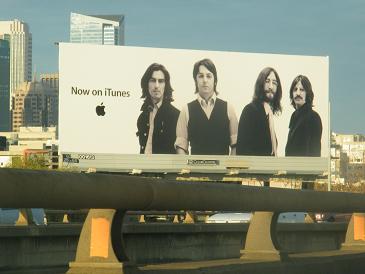Yoko Ono’s op-ed tribute to John Lennon in the New York Times today got me tearing up, as I remembered that horrible day, thirty years ago, when I heard that Lennon had been assassinated. I was in my early twenties and still living in England at the time, working in an inner-city school in Birmingham, and I remember feeling that his murder marked the death of my own generation’s innocence.
But as Ono points out in her sweet and funny tribute, Lennon’s untimely demise did not result in him being erased from the collective consciousness.
“People are not questioning if he is here or not,” Ono writes. “They just love him and are keeping him alive with love.”
Ono begins her tribute by revealing that Lennon was the tea maker in their relationship, a role he apparently assumed by dint of his being British.
“Yoko, Yoko, you’re supposed to first put the tea bags in, and then the hot water,” Lennon advised Ono, only to admit later that he had been doing it all wrong.
“I was talking to Aunt Mimi this afternoon and she says you are supposed to put the hot water in first. Then the tea bag,” Lennon said, a revelation that made them both crack up.
Ono’s account reminded me of my father, who was the official tea maker in my family and died overnight of a brain hemorrhage, 33 Christmases ago. A veteran of World War 11 who sailed on a miner sweeper with the Royal Navy, Daddy polished his shoes and made the tea each morning, before walking to the station at a brisk clip to catch the train to London, where he worked as an advertising executive, one of Britain’s original “mad men.”
I remember his morning tea-making ritual, because I was required to skip and do press-ups before breakfast, as part of Daddy’s training of his daughters as up and coming young tennis players. (My older sister was the real athlete, a tom boy who grew up playing rugby, I was the overweight book worm, and we both got forced to play tennis, a sport we became proficient in, but ditched at the end of high school, sick of the endless competition and parental pressure.)
I knew each morning that it was time to grab my skipping rope, when I’d hear the tea kettle whistling. According to Daddy, the proper way to make tea began with heating the water to an extended boil, then pouring it into empty tea cups and tea pot so as to warm them. Next, Daddy would place the water back on the burner to boil again, and spoon tea leaves (one spoon per person, plus one for the pot) into the warmed, but now emptied of water, pot.
Next, Daddy would pour boiling water over the tea leaves, cover the pot with a tea cozy (a little woollen hat with holes for the pot’s spout and handle) and let it stand for three minutes for a weak cuppa, longer for a stronger brew. Then he’d empty water from the warming tea cups, pour in the tea, and add milk and sugar. His method made a great cup of cha—and Daddy would often torment us by standing there and drinking it, in gutsy lip-smacking sips, in between telling us that we needed to skip faster and do an extra twenty push-ups, and perhaps some sit-ups, if he thought we were slacking.
I didn’t always appreciate my father while he was alive, but I loved him. And I still miss him to this day and I’m thankful for the things he taught me, including tea making. The same goes for Lennon. I didn’t always like everything he did, but I loved his music and what he stood for and I still miss him to this day, and I’m thankful for the message he brought to the world. Even though, according to Ono, he didn’t really know how to make tea.

